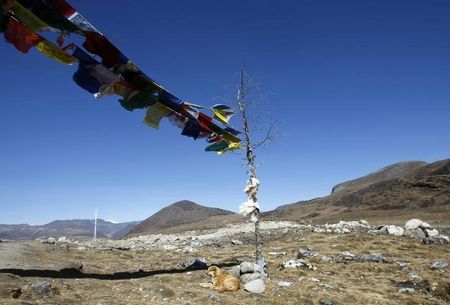By Sanjeev Miglani
NEW DELHI (Reuters) - India said on Tuesday it would firmly defend its 3,500-km- (2,200-mile-) long border with China after domestic media reported a new face-off on the disputed frontier, just days ahead of a visit by President Xi Jinping.
More than 200 soldiers of the People's Liberation Army crossed into what India considers its territory in Ladakh in the western Himalayas last week, and used cranes, bulldozers and a Hummer vehicle to build a 2-km (1.2-mile) road within it, the Hindustan Times said.
Indian soldiers challenged the Chinese troops and asked them to withdraw, the newspaper said. Then, on the night of September 10, soldiers demolished a temporary track built by Chinese forces.
There was no immediate comment by India's defence ministry.
Both China and India are trying to put a positive spin on Xi's first summit meeting with Indian Prime Minister Narendra Modi since the Indian leader took office in May. He arrives on Wednesday after touring the Maldives and Sri Lanka.
The two countries are expected to ramp up commercial ties and open the way for Chinese investment in Indian infrastructure, including railways, but the contested border remains a stumbling block to better political ties.
Both lay claim to vast tracts of territory and after two decades of talks are no closer to a resolution of a border dispute over which they went to war in 1962.
They have not even been able to agree on the Line of Actual Control where the two armies are deployed, leading to frequent reports of border violations.
"Let me assure you that our brave sentinels on the border will address any issue that happens on the border," said foreign ministry spokesman Syed Akbaruddin. "We are confident that our borders are in safe hands."
Modi and Xi will discuss the border dispute this week, he added.
In Beijing, Hong Lei, a spokesman for the Chinese foreign ministry, said the border issue had not affected the development of two-way ties.
"We hope that both sides can continue efforts to keep maintaining the peace and tranquillity of the border area and create a good atmosphere and good conditions for the development of relations," he told a daily news briefing.
India has reported a jump in border violations in the past two years that military experts say is a sign of greater Chinese assertiveness on the frontier. The government itself has sought to play down the incursions.
The number of Chinese infringements had reached 334 by August, the government told parliament last month. The corresponding figure in 2013 was 411, while in 2012 it was 426, in 2011 it was 213, and in 2010 it stood at 228.
China denies intruding into Indian territory.
In another wrinkle ahead of Xi's trip, India on Monday extended a $100-million export credit for defence deals to Vietnam and tightened energy ties with the country, which has strained ties with China, over an increasingly ugly territorial dispute in the South China Sea.
That included a deal to "consolidate" energy cooperation following a 2013 pact under which PetroVietnam offered India's ONGC oil and gas blocks for exploration and production.
If that pact covered Chinese waters in the South China Sea and any exploration went ahead without China's approval, Chinese foreign ministry spokesman Hong said the government would be "concerned".
He added, "We could not support it," but did not elaborate.
Relations sank to a three-decade low this year after China deployed a $1-billion oil rig to waters Vietnam claims as its exclusive economic zone, sparking a wave of riots and bloody clashes between Vietnamese and Chinese workers in Vietnam.

China claims almost the entire South China Sea, believed to be rich in deposits of oil and gas resources.
(Additional reporting by Ben Blanchard in BEIJING; Editing by Clarence Fernandez)
